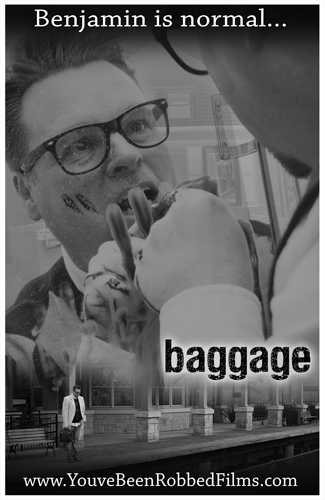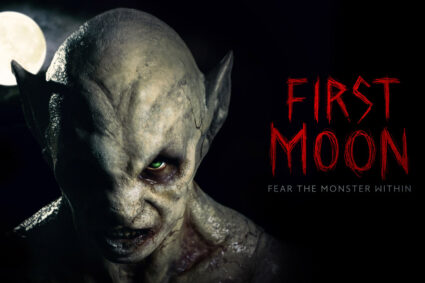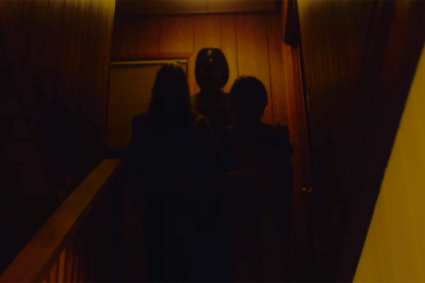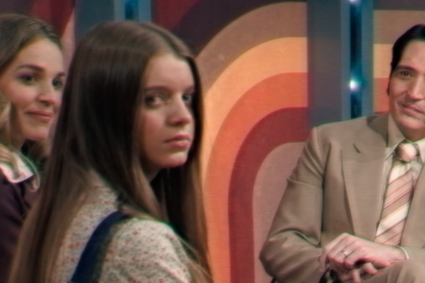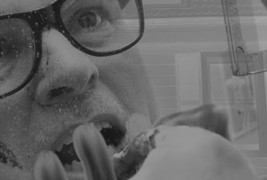
BAGGAGE, a new film written by Rob Dimension (NO CLOWNING AROUND) and directed by Jeremiah Kipp (CRESTFALLEN, THE DAYS GOD SLEPT), packs a lot into its sub-15 minute running time. It stars Dimension as Benjamin, an ostensible everyman who has a terrifying skeleton in his closet.
As the movie begins we watch Benjamin wake up to a blaring alarm clock. He lovingly pulls the blankets over the woman lying next to him in bed, and quietly shuffles out of the bedroom to start another day. After brushing his teeth and eating breakfast, he grabs his leather bag and heads out of the house to catch the train to his cubicle-ensconced home away from home.
Once Benjamin arrives at his office job, red flags start springing up. First off, it’s clear that he’s extraordinarily socially awkward and introverted. It also becomes obvious that whomever the woman is back home, she’s the object of Benjamin’s obsession. He’s also paranoid and possessive over his leather bag.
Later on, after Benjamin stops off for a drink, he’s pursued by a pair of street thugs who give chase and corner him as he tries to run for it. One of the punks pulls a gun and tries to jack Benjamin’s bag. At this point Benjamin unravels and, while struggling with the armed would-be mugger, manages to get ahold of the gun and shoot the punk dead.
Soon Benjamin arrives back home and that’s when reality becomes crystal clear as well as completely cuckoo bananas.
BAGGAGE represents quite a remarkable narrative journey for such a short movie and it drips with Hitchcockian tension and unease along the way. Ravenous Monster caught up with director Jeremiah Kipp to discuss BAGGAGE and the directorial approach of the man behind this black curtain. Read on, Horror Fans….
Ravenous Monster: BAGGAGE is Rob Dimension’s baby so to speak as he wrote, produced, and stars in it. How did you end up jumping onboard to direct?
Jeremiah Kipp: Rob had seen my short film CRESTFALLEN and enjoyed it. When we met in person at a horror convention, he told me the story for BAGGAGE and I was drawn in. The story had a quiet intensity, building up towards a nasty Grand Guignol climax. Rob was coming off of his gritty, sleazy horror short NO CLOWNING AROUND, which was kind of like Bozo the Clown meets THE MUPPET SHOW on crack. I had just completed a very dreamy, phantasmagoric and surreal movie called THE DAYS GOD SLEPT. Both of us were looking for something different, unique and outside of our comfort zone. When Rob offered me the chance to direct, I said, “Let’s go.”
RavMon: Are there differences in the way you tackle directing movies that you’ve had a hand in developing the whole way through versus movies that you’ve come to much later along in the process?
JK: There’s no difference, in that sense. Film is a collaborative medium. At the same time, every movie is uniquely different and has its own life. I treated BAGGAGE as if it were found art. Rob was playing the role of Benjamin, and drawing deep from his own demons. He’s nothing like this repressed, buttoned-down “trying to blend in and be normal” character; Rob has an intense personal charisma. But he also has a self-deprecating streak that he pushed further into the realm of deep self-loathing in this role. I drew inspiration from where Rob was going, and kept encouraging this method, which was uncomfortable for him a lot of the time. But we were all making an uncomfortable movie. The world is an aggressive place. My job was to keep Rob there. Sometimes I’d just bore my eyes into him and say, “Fuck you,” before doing a take and he’d lock into his zone. Thankfully, he never punched me out.
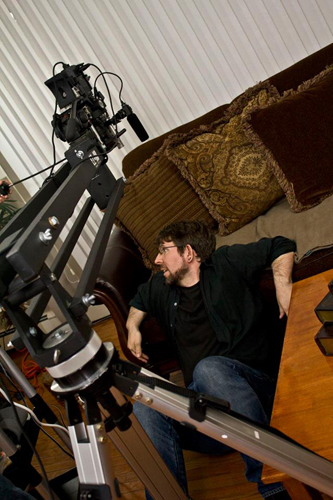
RavMon: What do you look for in a script when you’re asked to direct it?
JK: My first question is purely as an audience member. Would I be entertained by watching this film? And is this the kind of movie where, if I owned the DVD, I might want to own it and watch it a thousand times? You have to have that level of enthusiasm, because making a film is an extremely challenging task. If you aren’t wholeheartedly committed, you’ll burn out. Why would you want to work so hard on something you don’t love?
RavMon: What was your approach to BAGGAGE once you were on set?
JK: The making of the movie has a huge effect on how it turns out. I like creating a lot of focused energy on the set; I don’t like messing around. At the same time, you want to create a safe environment where the actors and crew can do their work, so they can be fearless. If you approach the work with hard-driving force, the camera responds and moves with a nervous energy. The actors are ready for combat. You can get good work done. Humor can be good too, sometimes, to help everyone relax; but when we’re in the moment and Rob has to be there digging deep into his soul, and our cameraman Jeffrey Scott Gould has to time the camera move based on that feeling, I like to be in an environment where you could hear a pin drop. Once you nail the shot, there’s a sense of tremendous joy, but only if everyone has pushed as far as they possibly can.
RavMon: Is your approach to directing consistent from film to film?
JK: It’s helpful to put the previous film out of your mind, and treat the new one as its own entity. The approach I took to making THE DAYS GOD SLEPT was different from CRESTFALLEN, and both of those had nothing to do with the way we made BAGGAGE. That said, I can’t escape myself; I have my interests and passions that I’m sure can be discovered in each movie. An actress once told me that even though I make horror movies, at heart I’m a romantic. BAGGAGE is, in its own morbid way, a love story.
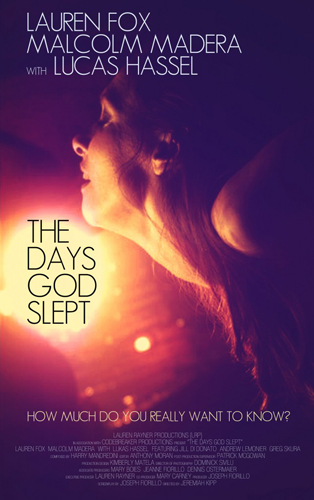
RavMon: Many of the shots in BAGGAGE have kinetic energy, a byproduct of camera movement and skewed angles. Was this a choice specific to Baggage or is it something rooted in your general style of direction?
JK: During my first meeting with our director of photography Jeffrey Scott Gould, he asked, “How do you feel about the moving camera?” My response was, “They’re called motion pictures!” By keeping the camera moving, the audience is drawn into the suspense without even really knowing why. It creates a sense of unease, as if we’re waiting for something to happen. We also enjoyed going for bold camera angles, overheads, shots that would crane up and down because that felt like the headspace of our character. Our assistant cameraman, Steve Adams, was often seeking out opportunities to rack focus from one object to another, which pushes the viewer’s attention wherever we want it to go. In the case of BAGGAGE, that felt right for the paranoid atmosphere. Often the rack was motivated by Benjamin’s fear: is someone watching me?
RavMon: What was behind the decision to shoot in black and white?
JK: That started with Rob. At first, we wanted to go in a similar direction to CRESTFALLEN, which used bold colors as if we were flipping through a photo album of someone’s life. But one day Rob mentioned black and white, perhaps out of his love for movies like Alfred Hitchcock’s PSYCHO. It got me to consider the possibility of making BAGGAGE like an episode from the 1960s TV series ALFRED HITCHCOCK PRESENTS. That restrained style would run in counterpoint to the gore and violence that this narrative drives towards.
RavMon: Let’s see if we can pull this off and safely navigate through spoiler-free territory: BAGGAGE successfully elicits empathy from us for Rob’s character, Benjamin, who’s a social misfit and sort of on the outside looking in even regarding his most mundane daily activities. After the film’s big reveal, that empathy seems to have the potential to backfire, a la Rob Zombie’s THE DEVIL’S REJECTS. Was a negative audience reaction something you all discussed? Was it a conscious choice to lead us down an ultimately illusory path or is it more just a case of it being inherent to the setup of the film?
JK: Rob and I talked a great deal about the climax. But I didn’t want to make a movie that was dependent on a twist ending. I remember watching THE SIXTH SENSE and figuring out halfway through what was going on, but I enjoyed the movie nevertheless because the characters and situations were interesting. I had empathy for Benjamin, but I think the filmmaker should love all of their characters. I was actually quite excited about the audience reaction, since the ending feels almost operatic to me. In his own way, Benjamin is more complete a human being by the ending than he is at the beginning. We all want to find our way home, right? We all want love and comfort.
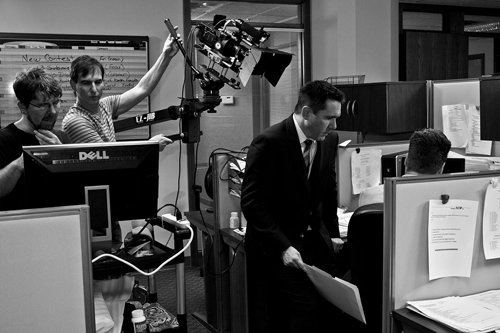
RavMon: Jeffrey Scott Gould was your DP this time out, a role usually occupied by the fantastic Dominick Sivilli. How was it working with Jeff and how does he compare to Dominick?
JK: I’ve worked with other cinematographers besides Dominick. He just happens to be a close collaborator and friend of mine, and we have a very strong working relationship. But choosing the director of photography is like selecting an actor. Each of them is unique. Jeff has a great passion for film noir and older Hollywood films; that felt like the right direction for BAGGAGE. During pre-production, Jeff was heavily involved in the location scouting and could easily change hats, so at times he could have the diplomacy of a producer and other times (most of the time) he’d be considering the aesthetics. We had an easy working vocabulary and a clear sense of what we were trying to accomplish, so on set we had the freedom to play, explore and discover things. He’s very communicative and open, and he, the assistant cameraman Steve Adams and I would be throwing out new ideas all the time. “How can we make this even more awesome?” was something that came up frequently. Those are the kind of people I enjoy working with.
RavMon: What did you guys shoot this with?
JK: The camera was Jeff’s Sony FS700 with a Metabones adapter so that we could use Canon Lenses. But you could shoot a movie with a DSLR or RED camera or Alexa or 16mm, and as much as those choices will define your aesthetics, the more important question is, “Who is the cinematographer?” A brilliant cameraman could make art on the iPhone and a lousy one can create amateurish footage on 35mm film stock.
RavMon: What plans do you have for BAGGAGE going forward?
JK: Rob is selling DVDs on his web site (www.youvebeenrobbedfilms.com) and we had our premiere at Monster Mania earlier this month. I’m sure Rob is going to take the film along the festival and convention circuit, so wherever he makes an appearance, I’m sure copies will be for sale at his table. The DVD also includes his short film NO CLOWNING AROUND as well as some behind-the-scenes goodies. So they’re getting some bang for their buck.
RavMon: Are there any plans to collaborate with Rob and Jeff more in the future?
JK: We’ve been talking about it. All of us were very happy and proud of the work we did on BAGGAGE. It was a solid collaboration. We were supportive of each other, which is not something you can take for granted in this business. All three of us have been in situations on other sets where it felt like the ground was being knocked out from under us because the folks we were working with were not on the same page as us, didn’t give a crap about the finished product, or let their ego drive them instead of making the best film possible. That’s a horrific situation for an artist. But it doesn’t have to be that way. Rob, Jeff and I were all about the movie. I think all of us felt personally and professionally rewarded, so hopefully we can do this dance again on something new.
RavMon: What’s next for you?
JK: My most recent new film will be an episode of Scott W. Perry’s horror-themed Web series IN FEAR OF, an episode about going blind starring Susan Adriensen from THE BLOOD SHED and UNDER THE RAVEN’S WING. That will appear online this October. THE DAYS GOD SLEPT is starting its festival life, and is ushering in a bunch of new projects. I had a great collaboration with writer/co-producer Joe Fiorillo, so we have some upcoming films in early pre-production. And our producer Lauren Rayner and I have a few movies on the horizon. Some more short films and, it seems, a second feature. I’m also proud to be assistant directing Dominick Sivilli’s next directorial effort, MMPR, a science fiction reboot of a TV show. Dom’s a wonderful director in his own right; his work with actors isn’t discussed often enough because his pictures are so astonishing. But he has a wonderful insight into human nature, a great sensitivity towards good performers. I’m excited to be going into the fray with him once again.
